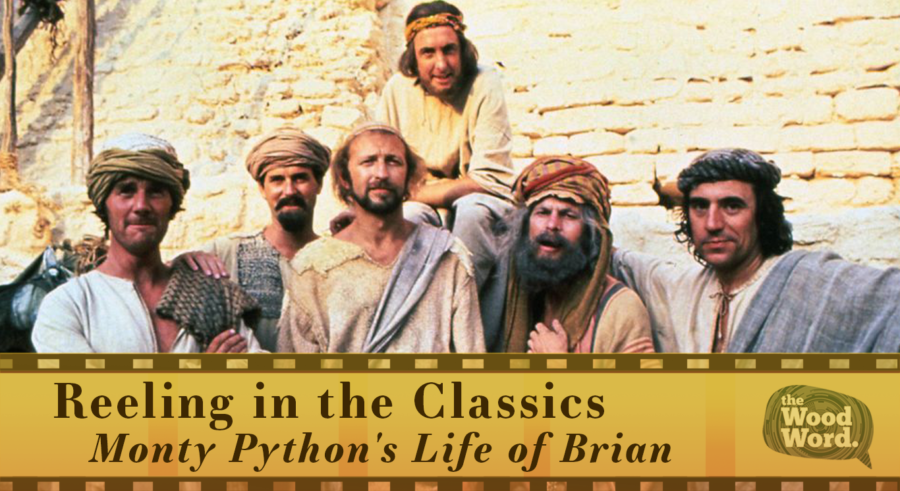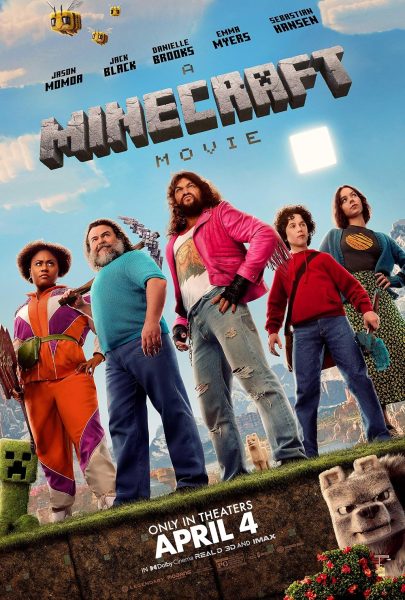Reeling in the Classics: “Monty Python’s Life of Brian”
Photo credit/ Jennifer Flynn
Brianna Kohut discusses if the classic Monty Python movie still holds up today.
With the Christian season of Lent well underway and Easter just around the corner, it feels timely to take a look at a film that became controversial due to its depictions of religion: the 1979 film “Monty Python’s Life of Brian”. A surreal and satirical examination of what happens when people take religion and beliefs too far, the film was banned in countries such as Ireland, Norway, Italy, and even almost in its native United Kingdom. Considering the envelope pushing the Pythons were known for, they merely used the notoriety to their advantage and branded advertisements for the film elsewhere, such as “So funny, it was banned in Norway”. Helping their argument, many critics, especially those in the U.K., missed the beginning of the movie, which made it clear it wasn’t nearly as guilty as it seemed.
Before we dive any deeper into the controversy, though, let’s discuss its beginnings and plot.
The movie was famously funded by none other than George Harrison of The Beatles, who did so out of his own pocket when initial production company EMI Films pulled their support. In what the Pythons have wryly called “the most expensive movie ticket in history”, Harrison gave them $4 million dollars to make the movie because of how desperately he wanted to see the finished product. As compensation, he received a small part in the film as the “owner” of the mountain that the Sermon on the Mount takes place on.
The movie revolves around Brian (Graham Chapman), an otherwise completely normal Judean man who was born next door to none other than Jesus Christ himself. As he reaches adulthood he attends the aforementioned Sermon on the Mount, meets his girlfriend Judith (Sue Jones-Davies), and joins one of the many “People’s Front of Judea” groups that spend more time squabbling than actually fighting the Romans that have occupied their land. After writing graffiti on the walls of Pilate’s palace and subsequently escaping execution, Brian, a perfectly ordinary man, finds himself in a situation that ensures that he will be misunderstood and treated as if he were Jesus for the rest of the film. Dodging crowds who swear up and down that Brian is the Messiah instead of Jesus, he continues to fight for the People’s Front but is eventually captured by Pilate once again. Following Jesus’ crucifixion from the Bible, but with a silly, Python twist all the way through, he is then tried and crucified in much the same manner. The movie ends with a character played by Eric Idle, who is also being crucified, leading the cast in a rousing, cheerful performance of the famous “Always Look on the Bright Side of Life”.
Despite the bannings, the movie still more than made back its budget, with a worldwide total of $20.7 million dollars. In the modern day, the film is very highly praised, scoring a 96% with the critics and a 93% with audiences on Rotten Tomatoes and a 8 out of 10 on IMDB. Naturally, along with everything else the Pythons have ever done, it is quoted en masse by fans. Good-humored priests of the Christian faith are even known to regard the film as a parody and will recommend the film to parishioners. However, as I mentioned in the introduction, it is the film’s reputation when it was released that is the main source of its controversy.
The reception this film got when it first came out is so legendary that a whole Pythonesque movie was made that chronicled the main things that happened after it came out. In short, the film was accused by the Catholic Church of being blasphemous, which was not helped at all by the Pythons correcting them that it was technically heresy instead. It all culminated in a debate between Pythons John Cleese and Michael Palin and English religious figures Mervyn Stockwood and Malcolm Muggeridge on BBC show “Friday Night, Saturday Morning”. When the latter two admitted that they missed the opening minutes that made it explicitly clear Brian was not Jesus, it was all downhill for them from there. While much of that particular controversy has died down over the years, another one has cropped up recently thanks to a scene involving Cleese as the People’s Front leader and Idle as a member named Stan…or rather, Loretta.
In a rather modestly played scene for its time, Idle’s character confesses to the leader that she wants to be a girl and would like to be called Loretta. When asked why by both Cleese and Jones-Davies as Judith, she reveals it’s because she wants to have children. A modest wish that gets her reprimanded and yelled at by Cleese, mainly due to how impractical her wish was for its time, both in-universe and out. Even after Judith tries to sway things in Loretta’s favor, it takes the leader the entire movie to start addressing her by her new pronouns. Even then, he still can’t understand why she wants what she does. It’s very obvious to see what the issue with this scene might be in the modern day, when more than ever transgender people are fighting for the rights to be both properly seen and heard. However, considering the time period this was made in,this scene could have easily been a lot worse in terms of representation.
As for the religious controversy, the film takes care to portray Jesus himself as a holy, clean figure at all times, despite everything else going on. His Sermon is quoted verbatim, with the only joke being that the main characters are too far back and can’t hear him right. Jesus being spared the fate he is associated with due to Brian suffering the crucifixion instead might be something positive in its own way, too. The point being that Christianity as a whole doesn’t really get too many sharp barbs, with the movie instead using Christianity as a tool to explore what happens when religious ideologies are taken too far. The film’s true stance on religion can be summed up as “religion is fine and dandy, and important, but if you don’t think for yourself and question your beliefs every now and then you’re not far off from Brian’s ‘followers’ in this film”.
It’s a shame about all of the controversy, as well as the Stan/Loretta scene, because most of this movie’s humor is still quite funny, with many quotable lines and even the non-satirical scenes being funny. It’s also quite commendable that, much like “Holy Grail,” all of the Pythons take turns playing almost every character who speaks and it’s also commendable that it all feels quite natural.
As a fan of the Pythons, I think it’s as hilarious as the rest of their output, but it absolutely could not be made today. Even if religion was not the taboo subject in non-religious movies it is today, perhaps because of this movie, scenes like Stan wanting to be Loretta and a rather small but unfortunate moment at the beginning involving the Pythons using brownface to play the Three Wise Men, would never fly today. Perhaps they could be, if the controversial elements were changed or removed, but never as is.
Pushing the envelope was what the Pythons excelled at, though, so if your tolerance of this sort of thing is high I would recommend watching “Life of Brian”. Just remember that Brian is in no way Jesus, unlike what people all those years ago thought.
Contact the Writer: [email protected]

Brianna Kohut is a senior Multimedia Communications major with a minor in Writing. She is also a DJ for VMFM 91.7. When not writing or serving popcorn...









